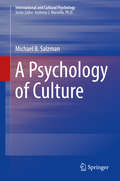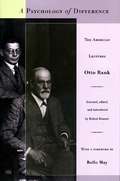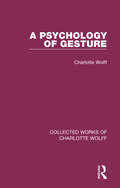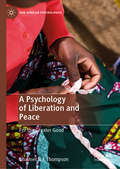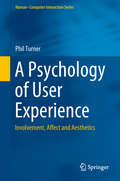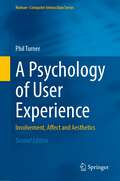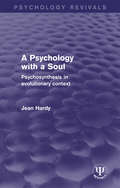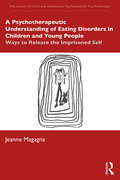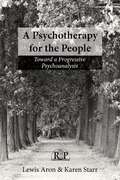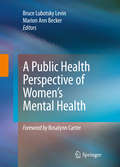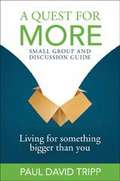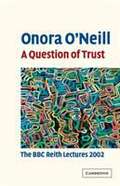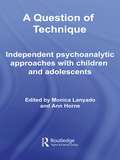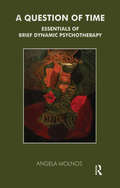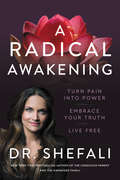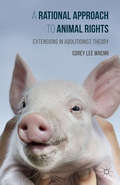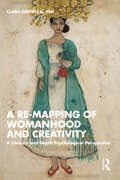- Table View
- List View
A Psychology of Culture (International and Cultural Psychology)
by Michael B. SalzmanThis thought-provoking treatise explores the essential functions that culture fulfills in human life in response to core psychological, physiological, and existential needs. It synthesizes diverse strands of empirical and theoretical knowledge to trace the development of culture as a source of morality, self-esteem, identity, and meaning as well as a driver of domination and upheaval. Extended examples from past and ongoing hostilities also spotlight the resilience of culture in the aftermath of disruption and trauma, and the possibility of reconciliation between conflicting cultures. The stimulating insights included here have far-reaching implications for psychology, education, intergroup relations, politics, and social policy. Included in the coverage: #65533; Culture as shared meanings and interpretations. #65533; Culture as an ontological prescription of how to "be" and "how to live. " #65533; Cultural worldviews as immortality ideologies. #65533; Culture and the need for a "world of meaning in which to act. " #65533; Cultural trauma and indigenous people. #65533; Constructing situations that optimize the potential for positive intercultural interaction. #65533; Anxiety and the Human Condition. #65533; Anxiety and Self Esteem. #65533; Culture and Human Needs. A Psychology of Culture takes an uncommon tour of the human condition of interest to clinicians, educators, and practitioners, students of culture and its role and effects in human life, and students in nursing, medicine, anthropology, social work, family studies, sociology, counseling, and psychology. It is especially suitable as a graduate text.
A Psychology of Difference: The American Lectures
by Otto RankA leading disciple and confidant of Freud, Otto Rank revolutionized the field of psychoanalytic theory in The Trauma of Birth (1924). In this book, Rank proposed that the child's pre-Oedipal relationship to the mother was the prototype of the therapeutic relationship between analyst and patient. Although Rank is now widely acknowledged as the most important precursor of humanistic and existential psychotherapy--influencing such well-known writers as Carl Rogers, Rollo May, and Ernest Becker--Rank's knotty prose has long frustrated readers. In this volume of Rank's lectures, Robert Kramer has brought together for the first time the innovator's clearest explanations of his most influential theories. The lectures were delivered in English to receptive audiences of social workers, therapists, and clinical psychologists throughout the United States from 1924 to 1938, the year before Rank's untimely death. The topics covered include separation and individuation, projection and identification, love and will, relationship therapy, and neurosis as a failure in creativity. The lectures reveal that Rank, much maligned by orthodox analysts, invented the modern object-relations approach to psychotherapy in the 1920s. In his introduction, based on private correspondence between Rank, Freud, and others in the inner circle, Robert Kramer tells the full story of why Rank parted ways with Freud. The collection of lectures constitutes a "readable Rank," filled with insights still relevant today, for those interested in the humanistic, existential, or object- relational aspects of psychotherapy, or in the development of the psychoanalytic movement.
A Psychology of Early Sufi Samâ`: Listening and Altered States (Routledge Sufi Series)
by Kenneth S. AveryAvery explores the psychology of altered states among the early Sufis. It examines samâ` - listening to ritual recitation, music and certain other aural phenomena - and its effect in inducing unusual states of consciousness and behaviours. The focus is on the earliest personalities of the Islamic mystical tradition, as mediated by texts from the tenth to the twelfth centuries C.E. These unusual states are interpreted in the light of current research in Western psychology, and also in terms of their integration into historical Islamic culture. A Psychology of Early Sufi Samâ` provides new insights into the work of five Sufi authors, and a fresh approach to the relation between historical accounts of altered states and current psychological thinking.
A Psychology of Gesture (Collected Works of Charlotte Wolff #2)
by Charlotte WolffOriginally published in 1945, this title was a follow-up to the author’s previous book The Human Hand. This time she looks at the psychology of gesture and its relation to personality. The special place that a psychology of gesture merits is obvious. It permits a direct knowledge of personality without any effort or misleading co-operation on the part of the subject, since it can be applied without his being aware of the fact. The book ‘is constructed on a system of clinical studies and medico-psychological interpretations.’ The author felt that this title must be regarded as a complementary study to her main studies.
A Psychology of Liberation and Peace: For the Greater Good (Pan-African Psychologies)
by Chalmer E. ThompsonThis book addresses the need to radically transform societies plagued by racism. It places prominence on persistent racialized violence in the lives of Black Americans as influential in how Black people in the U.S. and abroad perceive themselves as Black in juxtaposition to their perceptions of White people and other People of Color. An absence of understanding of the often-masked role of violence in the lives of Black people increases the likelihood of reproducing it. The author offers a reformulation of racial identity theory to examine the construction of Manichaeism in people and societies, and how meaningful engagement that confronts the violence is vital to psychological development, though this engagement also is not without dire risks.
A Psychology of User Experience: Involvement, Affect and Aesthetics (Human–Computer Interaction Series)
by Phil TurnerIt is well-established that while cognitive psychology provides a sound foundation for an understanding of our interactions with digital technology, this is no longer sufficient to make sense of how we use and experience the personal, relational and ubiquitous technologies that pervade everyday life. This book begins with a consideration of the nature of experience itself, and the user experience (UX) of digital technology in particular, offering a new, broader definition of the term. This is elaborated though a wide-ranging and rigorous review of what are argued to be the three core UX elements. These are involvement, including shared sense making, familiarity, appropriation and "being-with" technologies; affect, including emotions with and about technology, impressions, feelings and mood; and aesthetics, including embodied aesthetics and neuroaesthetics. Alongside this, new insights are introduced into how and why much of our current use of digital technology is simply idling, or killing time. A particular feature of the book is a thorough treatment of parallel, and sometimes competing, accounts from differing academic traditions. Overall, the discussion considers both foundational and more recent theoretical and applied perspectives from social psychology, evolutionary psychology, folk psychology, neuroaesthetics, neuropsychology, the philosophy of technology, design and the fine arts. This broad scope will be enlightening and stimulating for anyone concerned in understanding UX. A Psychology of User Experience stands as a companion text to the author's HCI Redux text which discusses the contemporary treatment of cognition in human-computer interaction.
A Psychology of User Experience: Involvement, Affect and Aesthetics (Human–Computer Interaction Series)
by Phil TurnerAs mainstream psychology was never intended for the HCI practitioner, this second edition of A Psychology of User Experience takes the opportunity to create a new chapter specifically written for practitioners, that is, UX-oriented psychology rather than the all-too familiar everyday variety. For example, we discuss our two modes of cognition (fast / slow or controlled / automatic); we underline the importance of familiarity; and how and why we check our phones every few seconds day or night. We also establish the ‘context for user experience’ noting that just about everyone uses a cell phone and very many own a smartphone too and have done so for years (so, how did they learn to use them?). User experience reflects the current vogue for “designing for experience” within HCI which we recognise as something we feel rather than have reasoned about. In the real world, our feelings tell us how we are doing but with UX, they tell us how we feel about using digital technology. Topics are introduced to UX which maybe unfamiliar such as virtual experiences and virtual emotions and the affect associated with the uncontrolled use of digital technology.A Psychology of User Experience stands as a companion text to the author’s HCI Redux text which discusses the contemporary treatment of cognition in human-computer interaction.
A Psychology with a Soul: Psychosynthesis in Evolutionary Context (Psychology Revivals)
by Jean HardyA comprehensive approach to self-realization, psychosynthesis was developed between 1910 and the 1950s by the Italian psychiatrist Roberto Assagioli. Assagioli like Jung, diverged from Freud in order to develop an understanding of human nature that took account of spiritual dimensions. This book, originally published in 1987, is an exploration of psychosynthesis and the depth of mystical and scientific ideas behind it. It will be of great value to all those interested in personal integration and spiritual growth in general, and psychosynthesis in particular. Focusing on psychosynthesis as transpersonal psychology, Jean Hardy describes how the ideas behind psychosynthesis spring both from scientific study of the unconscious and from the long mystical tradition of both the Easter and Western world. She shows how the roots of a modern spiritual, or transpersonal, psychology lie in a split tradition within the Western world – while psychology aspires to be scientific, religion or mystical knowledge is currently studied within the discipline of theology. The two have up till now been very little related, and the special achievement of psychosynthesis as a therapy is that it relates the soul and theology to the personality and psychology, and perceives personal and developmental patterns as a microcosm of larger social and historical patterns.
A Psychotherapeutic Understanding of Eating Disorders in Children and Young People: Ways to Release the Imprisoned Self (The Library of Child and Adolescent Psychoanalytic Psychotherapy)
by Jeanne MagagnaThis important book shows how psychotherapy can address severe eating disorders in children and young people, illustrating the ways an imprisoned self can be released from suffering. The book features a range of case studies while addressing core issues such as self-harm, hallucinations and the threat of suicide, as well as related topics such as depression and psychosis. Illustrating the psychological roots to eating disorders, it places therapy within hospital, clinical and multi-disciplinary contexts, as well as displaying how psychoanalytic theory can be applied across various settings and in different teams. Written by an eminent author in the field, this will be a key text for anyone wishing to understand eating disorders in children from a psychotherapeutic and psychoanalytic dimension.
A Psychotherapist Paints: Insights from the Border of Art and Psychotherapy (The New International Library of Group Analysis)
by Morris NitsunA Psychotherapist Paints is a unique account of an internationally known psychotherapist and group analyst’s struggle to bring together his psychological experience and his interests and talent as an artist. This book describes a body of painting that was responsive to a major existential challenge, the COVID-19 pandemic, but which also comes from deeply personal experience; the paintings are a mirror of life through the decades. These paintings, fifty of which are included here in full colour, were mainly presented online to groups both small and large, who were invited to participate in a dialogue that became a vital part of the developing project. The value of this dialogue is reflected in the author’s concept of the "artist's matrix", describing the social context in which an artist produces and presents their work. The paintings, together with the autobiographical narrative and the groups’ generativity, combine to produce a moving testament to our times. Intrinsic to A Psychotherapist Paints is a question about what makes us creative and how creativity transforms our lives. The result is a work of both artistic and psychological power that will inspire psychotherapists, art psychotherapists and artists themselves, and will point to exciting new possibilities in all these fields.
A Psychotherapy for the People: Toward a Progressive Psychoanalysis (Relational Perspectives Book Series)
by Lewis Aron Karen StarrHow did psychoanalysis come to define itself as being different from psychotherapy? How have racism, homophobia, misogyny and anti-Semitism converged in the creation of psychotherapy and psychoanalysis? Is psychoanalysis psychotherapy? Is psychoanalysis a "Jewish science"? Inspired by the progressive and humanistic origins of psychoanalysis, Lewis Aron and Karen Starr pursue Freud's call for psychoanalysis to be a "psychotherapy for the people." They present a cultural history focusing on how psychoanalysis has always defined itself in relation to an "other." At first, that other was hypnosis and suggestion; later it was psychotherapy. The authors trace a series of binary oppositions, each defined hierarchically, which have plagued the history of psychoanalysis. Tracing reverberations of racism, anti-Semitism, misogyny, and homophobia, they show that psychoanalysis, associated with phallic masculinity, penetration, heterosexuality, autonomy, and culture, was defined in opposition to suggestion and psychotherapy, which were seen as promoting dependence, feminine passivity, and relationality. Aron and Starr deconstruct these dichotomies, leading the way for a return to Freud's progressive vision, in which psychoanalysis, defined broadly and flexibly, is revitalized for a new era. A Psychotherapy for the People will be of interest to psychotherapists, psychoanalysts, clinical psychologists, psychiatrists--and their patients--and to those studying feminism, cultural studies and Judaism.
A Public Health Perspective of Women’s Mental Health
by Marion Ann Becker Bruce Lubotsky LevinA Public Health Perspective of Women's Mental Health Edited by Bruce Lubotsky Levin and Marion Ann Becker As many as one-half of all women in the U.S. will experience some form of mental illness in their lives--an especially distressing fact when health care budgets are in flux, adding to existing disparities and unmet health needs. Written from a unique multidisciplinary framework, A Public Health Perspective of Women's Mental Health addresses today's most pressing mental health challenges: effective treatment, efficient prevention, equal access, improved service delivery, and stronger public policy. Eminent clinicians, researchers, academicians, and advocates examine the effects of mental illness on women's lives and discuss the scope of clinical and service delivery issues affecting women, focusing on these major areas: Epidemiology of mental disorders in girls, female adolescents, adult women, and older women. Selected disorders of particular concern to women, including depression and postpartum depression, eating disorders, menopause, chemical dependence, and HIV/AIDS. Mental health needs of women in the workplace, rural areas, and prisons. Racial and ethnic disparities and their impact on service delivery. Parenting and recovery issues in mothers with mental illness. Women's mental health services in an era of evidence-based medicine. Improving women's health in today's technological climate. A Public Health Perspective of Women's Mental Health is a resource of immediate importance to professionals and graduate students in the public health, health administration, health disparities, social work, behavioral health, and health services research fields, as well as nursing, community/health psychology and community/public psychiatry.
A Quality of Life Approach to Career Development
by Geoffrey PeruniakCareer development - the processes that shape a person's career over his or her life - is a relatively new field of research in applied psychology. In A Quality of Life Approach to Career Development, Geoffrey S. Peruniak draws from philosophy, sociology, literature, anthropology, psychology, political science, and economics to form a new, holistic approach to career development that extends beyond paid work to include all aspects of life. Emphasizing that a person is a whole entity rather than a role or category, Peruniak also explores nature and the place of community in relation to career development theories.A highly original text with broad theoretical appeal to several disciplines, A Quality of Life Approach to Career Development also includes exercises and case studies. Most importantly, this book provides a new approach that will complement more specialized methods and serve as a foundation for further study in the field.
A Quest for More: Living for Something Bigger Than You
by Paul David Tripp Michael BreecePaul David Tripp expertly traverses the deepest recesses of the human heart and compassionately invites fellow Christian travelers to journey with him into God's bigger kingdom in this comprehensive personal and group study guide. Readers will appreciate and be challenged by the extensive and intuitive questions and comments that skillfully lead individuals through the text of A Quest for More while allowing for more in-depth interaction and introspection in both a personal and group setting. Whether used at home for personal study or offered as a church-wide series, this flexible guide will effectively meet the end goals of deeper biblical understanding and powerful life changes.
A Question Of Trust: The BBC Reith Lectures 2002
by Onora O'NeillOnora O'Neill's timely new work highlights a great paradox: in order to inspire trust, we, the public, require more accountability, more transparency. But the more we learn about our financial institutions, our politicians, our medical practitioners, our clergy, and many other people who have a direct effect on our lives, the less willing we are to trust them. Their word is doubted, their motives questioned. Whether real or perceived, this crisis of trust has a debilitating impact on society and democracy. Can trust be restored by making people and institutions more accountable in a modern democracy? Or do complex systems of accountability and control damage trust? O'nora O' Neill challenges current approaches to accountability, investigates sources of deception in our society and re-examines questions of press freedom. |L O'Neill presented these ideas this spring as a part of the BBC Radio 4's reith Lectures. Established in 1948, the Reith Lectures are presented to advance public understanding about significant issues of contemporary interest. Previous lecturers include Bertrand Russel, Robert Oppenheimer, and J.K. Galbraith.
A Question of Technique: Independent Psychoanalytic Approaches with Children and Adolescents
by Ann Horne Monica LanyadoA Question of Technique focuses on what actually happens in the therapy room and on the technical decisions and pressures that are faced daily. Coming from the Independent tradition in British psychoanalysis, the contributors, a range of experienced practitioners and teachers, describe how their technique has quietly changed and developed over the years, and put this process in its theoretical context. This book will appeal to child and adolescent psychotherapists, analysts and counsellors who wish to explore more Winnicottian approaches to therapeutic work.
A Question of Time: Essentials of Brief Dynamic Psychotherapy
by Angela MolnosAngela Molnos describes her own concept of "destructive idealization" in which splitting conceals its ultimate destructiveness, which she found so clearly in her studies with staff working with AIDS sufferers. She presented this book on the basis of her talks in 1993 and 1994.
A Quiet Kind of Thunder
by Sara BarnardPerfect for fans of Morgan Matson and Jandy Nelson. A girl who can&’t speak and a boy who can&’t hear go on a journey of self-discovery and find support with each other in this gripping, emotionally resonant novel for &“readers who enjoyed John Green&’s Turtles All the Way Down&” (Booklist) from bestselling author Sara Barnard. Steffi doesn&’t talk, but she has so much to say. Rhys can&’t hear, but he can listen. Steffi has been a selective mute for most of her life. The condition&’s name has always felt ironic to her, because she certainly does not &“select&” not to speak. In fact, she would give anything to be able to speak as easily and often as everyone around her can. She suffers from crippling anxiety, and uncontrollably, in most situations simply can&’t open her mouth to get out the words. Steffi&’s been silent for so long that she feels completely invisible. But Rhys, the new boy at school, sees her. He&’s deaf, and her knowledge of basic sign language means that she&’s assigned to help him acclimate. To Rhys, it doesn&’t matter that Steffi doesn&’t talk. As they find ways to communicate, Steffi discovers that she does have a voice, and that she&’s falling in love with the one person who makes her feel brave enough to use it. But as she starts to overcome a lifelong challenge, she&’ll soon confront questions about the nature of her own identity and the very essence of what it is to know another person.
A Radical Awakening: Turn Pain into Power, Embrace Your Truth, Live Free
by Dr Shefali TsabaryBestselling author and renowned clinical psychologist Dr Shefali teaches women how to transcend their fears, break free from societal expectations and rediscover the person they were always meant to be.A Radical Awakening lays out a path for women to heal their psychic wounds and prepares them to discover their own powers to help heal others and the planet. Dr Shefali helps women uncover the purpose that already exists within them and harness the power of authenticity in every area of their lives.This is an eloquent and inspiring, practical and accessible book, backed with real-life examples and personal stories, that unlocks the extraordinary power necessary to awaken the conscious self. Dr Shefali will empower and inspire all women to uncover the person they always wanted to be: fully present, conscious, and happy, by deconstructing the archetypes that still exist in society today, inspiring women to live authentically - and, importantly, elevate other women along the way.'The world needs to know. Trailblazing. Life-enhancing. A Radical Awakening is one of those books you will want to keep on your nightstand.' - Oprah Winfrey during 'Oprah's Your Life in Focus'
A Radical Awakening: Turn Pain into Power, Embrace Your Truth, Live Free
by Dr Shefali TsabaryThe New York Times bestselling author and renowned clinical psychologist teaches women how to transcend their fears and illusions, break free from societal expectations, and rediscover the person they were always meant to be: fully present, conscious and happy.A Radical Awakening lays out a path for women to heal their psychic wounds and prepares them to discover their own powers to help heal others and the planet. Dr Shefali helps women uncover the purpose that already exists within them and harness the power of authenticity in every area of their lives.This is an eloquent and inspiring, practical and accessible book, backed with real-life examples and personal stories, that unlocks the extraordinary power necessary to awaken the conscious self. Dr Shefali will empower and inspire all women to uncover the person they always wanted to be: fully present, conscious, and happy, by deconstructing the archetypes that still exist in society today, inspiring women to live authentically - and, importantly, elevate other women along the way.(P)2021 Harper Collins
A Radical Awakening: Turn Pain into Power, Embrace Your Truth, Live Free
by Shefali TsabaryThe New York Times bestselling author and renowned clinical psychologist teaches women how to transcend their fears and illusions, break free from societal expectations, and rediscover the person they were always meant to be: fully present, conscious, and fulfilled.A Radical Awakening lays out a path for women to discover their inner truth and powers to help heal others and the planet.Dr. Shefali helps women uncover the purpose that already exists within them and harness the power of authenticity in every area of their lives. The result is an eloquent and inspiring, practical and accessible book, backed with real-life examples and personal stories, that unlocks the extraordinary power necessary to awaken the conscious self.
A Rage To Kill And Other True Cases: Anne Rule's Crime Files, Vol. 6 (Ann Rule's Crime Files #6)
by Ann RuleNew York Times bestselling author Ann Rule brings several riveting accounts of seemingly normal men and women who are compelled by a murderous rage to suddenly lash out in this installment of her Crime Files. Ann Rule dives into one of Seattle&’s most infamous crimes: a city bus ride that turned into mayhem and murder at the hands of a gunman. With her signature &“devastatingly accurate insight&” (The New York Times Book Review), she unmasks the forces that drove quiet, clean-cut Silas Cool to shoot the driver, causing the bus to plunge off the Aurora Bridge into an apartment building. Included here are nine other cases that illuminate Rule&’s unique and authoritative view of the human psyche gone temporarily berserk. In A Rage to Kill, Ann Rule frighteningly shows that none of us are truly protected from the flashes of irrational violence that can erupt from the killers among us.
A Rational Approach to Animal Rights: Extensions in Abolitionist Theory
by Corey WrennApplying critical sociological theory, this book explores the shortcomings of popular tactics in animal liberation efforts. Building a case for a scientifically-grounded grassroots approach, it is argued that professionalized advocacy that works in the service of theistic, capitalist, patriarchal institutions will find difficulty achieving success.
A Re-Visioning of Love: Dark Feminine Rising
by Ana MozolIn A Re-Visioning of Love: Dark Feminine Rising, Ana Mozol parts the illusory veils of persona as she explores the reality of feminine experiences relating to love, trauma and sexuality in contemporary Western society. Mozol takes us on a personal journey through the three levels of experience, delving into the underworld and the trauma of rape, the middle world and the illusions of romantic love, and the upper world and the masculine spiritual ideals that fracture the feminine soul. In this multidisciplinary examination of the feminine, Mozol seeks to understand violence against women intrapsychically, interpersonally and within the field of depth psychology. The book begins with Mozol’s own experiences with violence and her exploration of the demon lover complex and the stages of breaking this complex after trauma. Combining personal testimony, theoretical reflections, historical analysis, and 20 years of clinical experience, Mozol uses a heuristic approach to explore personal stories, clinical material, dreams and depth analysis as they connect to the female individuation process. We follow Mozol’s journey through the middle world and the illusions of romantic love, into the upper world and the complexity of Oscar Wilde’s feminine character Salomé who represents the rising dark feminine energy that must be reckoned with for the possibility of love to exist. Accessible yet powerful, Mozol uses her personal story to place the oppression of women within the Jungian context of individuation. A Re-Visioning of Love: Dark Feminine Rising will be key reading for academics and students of Jungian and post-Jungian studies, psychotherapy, trauma studies, gender studies, women’s studies and criminology. It will also be an indispensable resource for Jungian psychotherapists and analytical psychologists in practice and in training. A Re-Visioning of Love, however, is more than a psychological exploration; it is a memoir of the personal and archetypal feminine and as such will appeal to anyone interested in the story of many women today.
A Re-mapping of Womanhood and Creativity: A Literary and Depth Psychological Perspective
by Clara Oropeza, PhDA Re-mapping of Womanhood and Creativity investigates the diverse ways in which women set out to find a matrilineal line as a wellspring for creative transformation, and, through a lens of analytical psychology, how we read women’s literary history and narratives about womanhood.While following the feminine influences that forged her own search and nature as a writer, this book re-maps the life and work of Clara Oropeza’s literary mother, Anaïs Nin, focusing on Nin’s formative affinity with her mother, alongside her own personal mother. In this mother-map, Oropeza looks closely at the relationship between mothers and daughters, the formation of the maternal wound, and ways to move towards healing. Oropeza examines the pivotal role that a reconnection to a maternal line has in shaping a woman’s creative life. This book argues that synthesizing our intellectual, spiritual and ancestral ways of knowing, away from the harmful narratives that shape our lives, is essential today. With scholarly and personal insight, Oropeza sheds new light on how women come to shores of understanding themselves beyond unresolved familial and historical tensions.Combining literature, myth and psychology, this book will be an illuminating read for students, scholars and professionals in the areas of literature, psychoanalysis and mythology. This book will be crucial reading for women, in particular women of color, interested in the process of individuation, creativity and womanhood.
